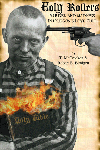Creffield and the Holy Rollers made page one headlines from 1903 to 1907. When I was researching Holy Rollers: Murder and Madness in Oregon’s Love Cult I spent months transcribing hundreds of articles. I’m not sure why I was so obsessive. Maybe it was my way of immersing my self into a cult without joining one. Anyway, I’m posting them all for those who are really interested in the story, or are interested the history of journalism, or are interested in how a scandalous story played out in the "media" in a by gone era. Since I no doubt made typos and unconsciously corrected papers' typos, these web pages should not be cited in anything serious (e.g. your dissertation). For such projects they should only be used as starting points and you should refer to the original sources. If you want a shorter version of the story, buy my book. Enjoy.
July 3, 1906: Hurt Tells of Debauched Wife and Debased Sisters
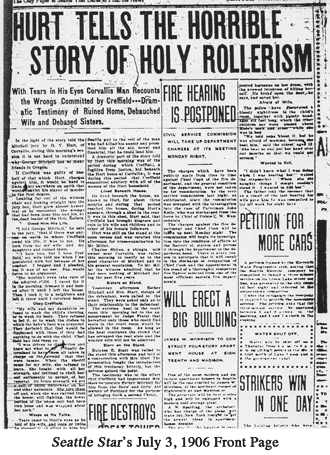 Seattle Star 7/3/1906 p1
Seattle Star 7/3/1906 p1
Hurt Tells the Horrible Story of Holy Rollerism
With Tears in His Eyes Corvallis Man Recounts the
Wrongs Committed by Creffield--Dramatic Testimony of Ruined Home, Debauched
Wife and Debased Sisters.
In the light of the story
told the Mitchell jury by O. V. Hurt, of Corvallis, during this morning’s
session it is not hard to understand why George Mitchell has so many friends in
Oregon.
If Creffield was guilty of
one half of that which Hurt charges against him, it would be hard to find a
jury anywhere on earth that would convict his slayer of murder in the first
degree.
Leaning far out of the
witness chair and looking straight into the jury box, Hurt grew almost
hysterical as he counted the wrongs that had been done him and his by the dead
leader of the Holy Rollers.
OWED HIM HIS LIFE
“I told George Mitchell,” he
said to the jury, “that if there was anyone on earth to whom Creffield owed his
life, it was to me. He took from me my wife and my daughters and ruined them.
“’I hate you, but I love
Creffield,’ my wife told me when I expostulated with her because of her
conduct. I begged and I pleaded, but it was of no use. She would listen to no
argument.
“She wouldn't even take care
of the adopted child. I cared for it in the morning, dressed it and looked
after it until I left the house. Then I took it to a neighbor’s and left it
there until I returned home.
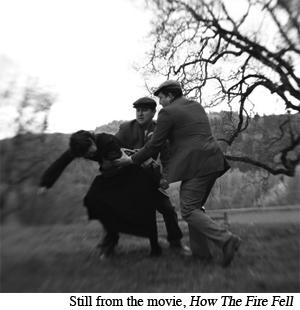 OBEY CREFFIELD
OBEY CREFFIELD
“My wife and my daughters
refused to wash the child’s clothing, or to wash its body. They refused to feed
it, or to wash the dishes in which the baby’s food was prepared. They declared
that God would be displeased with them if they had anything to do with the
child. Creffield had told them so.
“I was driven to distraction
and know not what to do. I finally determined to have them all taken in charge
on the ground that they were insane. When the sheriff came for my wife, she
refused to leave. She fought with all her strength, and declined to cloth
herself sufficiently to permit of her removal. By brute strength we put a suit
of union underwear on her and other garments. She tore them off and when she
was carried from the house, still fighting, the lower portion of the union suit
had been torn loose and was wrapped about her neck.
WEEPS AS HE TALKS
Tears came to Hurt’s eyes as
he told of his wife, and once or twice he stopped in an effort to hide his
feelings.
He was on the witness stand
all morning, and he told the complete story of Holy Rollerism in Corvallis. He
made a good witness for the defense. His story was told in a straightforward,
convincing manner.
It was the story of a
law-abiding, honest citizen who had been terribly wronged by the man of whom he
spoke. Another man places as Hurt had been placed might have saved George
Mitchell imprisonment and trial of a murder charge. Another man with less respect for the law and his Maker would have gone with a gun
and rested only when Creffield’s body lay at his feet lifeless.
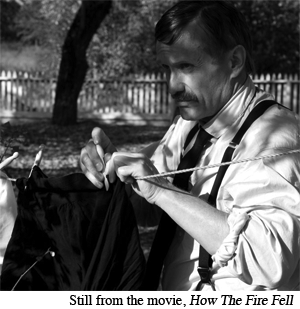
David Poland as O.V. Hurt
STANDS BY MITCHELL
There is little wonder that
Hurt is doing all within his power to free Mitchell of the charge against him. He
tried to dissuade Mitchell from the killing of Creffield, but when the deed was
committed, and the message came to him “I have got my man; am in jail,” he
hurried to Seattle and to the cell of the man who had killed his enemy and
promised him all the aid, moral and financial that he could lend him.
A dramatic part of the story
told by Hurt this morning was of the period during which Creffield, a fugitive
from justice, hid beneath the Hurt home at Corvallis. It was during this period
that Creffield committed adultery with all the women of the Hurt household.
LIVED BENEATH HOUSE
Hurt was still on the stand
at the noon recess and was recalled this afternoon for cross-examination by Mr.
Miller.
Charles Shires, a shingle
mill owner near Corvallis, was called this morning to testify as to the good
character of Mitchell and to his general reputation. To Mr. Miller the witness
admitted that he had seen nothing of Mitchell during the past five years.
SISTERS ON STAND
Yesterday afternoon Esther
Mitchell and Mrs. Starr, sisters of the defendant, were called to the stand. They
were asked only as to their relationship to the defendant.
The extreme heat in the court room this morning led to the announcement by Judge
Frater that hereafter only those who could find seats in the court room would
be allowed in the room. As long as the heat continues the crowd that has
occupied the rear aisle and the window sills, will not
be admitted.
STARR ON THE STAND
Burgess E. Starr was called
to the stand this afternoon and told of a conversation with Mrs. Hurt. The
prosecution fought the introduction of this testimony bitterly, but the defense
gained the point.
The testimony was to the
effect that Creffield had importuned Mrs. Hurt to procure Esther Mitchell for
him from the Boys’ and Girls’ Aid society of Portland for the purpose of
bringing forth a second Christ.
Seattle Daily Times 7/3/1906 p1
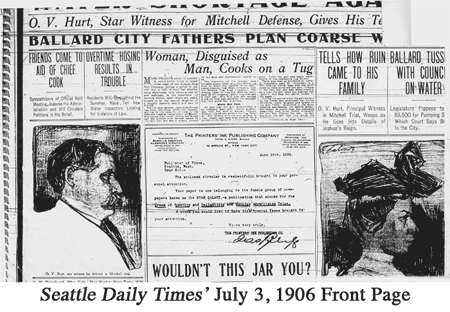
O. V. Hurt, Star Witness for Mitchell Defense, Gives
His Testimony
Tells How Ruin Came To His Family
O. V. Hurt, Principal Witness in Mitchell Trial,
Weeps as He Goes Into Details of Joshua’s Reign.
Is Not Permitted to spare His Feelings, Attorney
Forcing Each Minute Particular From Unwilling Lips.
Intent is to Show That Knowledge of These Things Led
Defendant to Kill Creffield to Protect His Sister.
by E. O. Kelsey
O. V. Hurt, father of Maud
Creffield, the 16-year-old girl, May, and husband of the woman the false prophet
called “Mother” Hurt, has furnished the first tragedy of the Mitchell trial. It
was not high tragedy, only the halting story of a man who has seen his loved
ones fall victims to the spell cast by a lustful human who accomplished his
desires only after he had convinced those he ruined that he was God.
Neither did any forensic
display accompany this story of ruined lives, but it was tragedy nevertheless
for a strong man nerved himself to place before the public remnants of a broken
heart; to tell to all the world the details of that which had caused him grief
and shame greater than which no man can know. It was hard for the man to do
this, but he felt that in so doing he was helping save from the unsympathetic
hand of the law the man who in avenging his own wrongs had revenged the wrongs
of others, and he choked back the emotion which at times threatened to strangle
him and talked on to the jury men whom he could not see for the tears which
welled up in his sad old eyes.
SISTERS DISAPPOINT CROWD
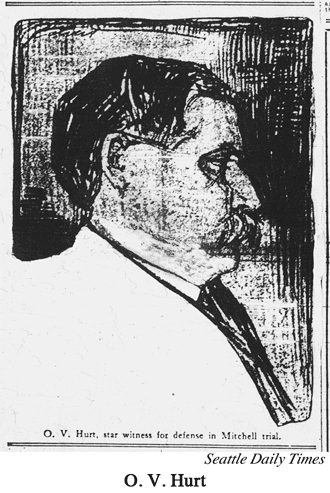 Seattle Star
Seattle Star
It was well for the curious
who had crowded into the courtroom to listen to the shocking story that O. V.
Hurt was placed upon the stand, for otherwise two days of the trial would have
gone down in their history as ones of disappointment. It is true that Attorney
Shipley, in his statement to the jury, afforded the morbidly curious food, but
both of the Mitchell sisters proved to be a disappointment for neither went
further than to acknowledge her relationship to the defendant and to tell of
the fact that another brother, Fred, has attempted to shoot himself in
Portland.
They are peculiar looking
women, Esther Mitchell and Mrs. Starr. Both have a resemblance to George
Mitchell. Both are sallow and have a strange look in their eyes. Neither gave
so much as a glance at the brother sitting in front of them, and both answered
the few questions put to them by Attorney Will Morris and Assistant Prosecuting
Attorney John Miller sullenly and in a voice scarcely louder than a whisper. It
was easy to see why it became necessary to bring Mrs. Starr into court by a
bench warrant. She was there under protest and would do nothing she was not
compelled to do by the law to lend aid to her brother.
She must have known that the
crowd had learned of the disgrace which her worship of Creffield had brought
upon her, but if so she gave no evidence of it and held her head high as she
followed the court officer through the packed aisle, both to and from the
witness stand.
BECOMES ANIMATED
Only once did she give any
intimation that she was more than an automaton. That was when, after she had
said that Fred Mitchell had shot himself, she was asked by Mr. Miller if she
knew it to be a fact.
“I wasn’t there,” she
snapped, “And someone else might have done it for all I know, but I have always
supposed he did it himself.
Mrs. Starr was also called
upon to identify three letters, the contents of which were not made public,
although it became known that one of them was the note she had left for her
husband when she crept out of her home early one morning and started on the
long tramp to join Creffield.
This was all, and so it was
that O. V. Hurt saved the day for the morbid.
ATTORNEYS ARGUE MUCH
Constant bickerings between
the attorneys for the state and the defense gave the comedy sketches to the tragedy which was being unfolded, and once the jury was sent
to its room while the attorneys for the defense gave vent to certain
expressions of opinion which they wanted to go on record. The cause was a
ruling of the court with regard to the introduction of certain testimony coming
from Hurt. Judge Frater had sustained the objection made by Assistant
Prosecuting Attorney Miller.
Mr. Morris said he wanted
the records to show that he not only objected to what he termed the arbitrary
ruling of the court, but further to the expression of feeling in the manner in
which the court addressed the counsel.
Mr. Miller said: “I would
like the record to show that the counsel had persisted in addressing the court
when there was nothing before it.”
Mr. Morris: “Yes, and I
would further ask that the record show that this was because it was an
arbitrary ruling and we were given no chance to support our side of the case.”
After Mr. Shipley had also
interposed an objection to the court’s ruling, Judge Frater asked if that was
all, and there being no answer, ordered the bailiff to
bring in the jury.
WILL LIMIT CROWD
As usual, the court room was jammed and that fact and the outside
temperature made the atmosphere almost unbearable. (The article under this one
on p2 has the headline “Hot In Olympia,
Thermometer Registers 96 Degrees In Mid-Afternoon). Before court adjourned
for the noon recess Judge Frater made a ruling that hereafter no more
spectators were to be allowed in the room than could find seats.
Through it all George
Mitchell sat toying alternately with a strap used by his counsel to bind up
their law books and a picture which Mr. Morris had brought into court showing
Mitchell’s sisters and the other Holy Roller dupes as they looked while in camp
up the river from Corvallis.
Mitchell has become a hero
to a number of the women who are in constant attendance at the trial and as he
is led back to his cell in the county jail hands are thrust at him, flowers
presented and many words of commendation and good wishes are spoken to him.
For a brief moment yesterday
afternoon he was permitted to hold one of the little Starr children on his lap.
Mrs. Starr had been brought into court by a deputy sheriff and with her were
the two children. One of them spying her uncle ran to him and threw her tiny
arms about his neck and snuggled her golden head against his shoulder. It was
only for a moment, however, and then the deputy sheriff led the little one back
to its mother who was in the judge’s chambers.
HOW A HOME WAS RUINED
O. V. Hurt had met George
Mitchell in Portland the month before the latter killed Creffield, and told him
the whole story of the doings of the Holy Rollers. It was because of this fact
that his testimony was admitted, its purpose being to establish the fact that
Mitchell was insane. There were times during the recital when Hurt halted and
begged to be relieved from going into further details, but Attorney Morris was
obdurate, and so, bit by bit, the ruins of this man’s life were laid bare.
He told, even as he had told
Mitchell, of the coming of the man who brought devastation with his coming;
told how a happy family of which love was the keystone had become divided and
had gone mad over religion and plunged into degradation. So fond of children
that when her own had grown into manhood and womanhood, she had taken a little
waif into her heart and had cherished it. “Mother” Hurt had, under the
influence of Creffield, cast this child away from her and had scorned the man
with whom she had lived for so many years.
“My wife and daughters came
to believe that I was defiled, and that this little one was defiled,” said
Hurt. “They would not cook for us, nor speak to us, and one time, at the
suggestion of that viper, talked of making sacrifice of the child; they would have
burned him along with their clothing, their furniture and the cats and dogs
which they declared to be of this world and unfit to live. They were all
crazy--yes, all crazy.”
RECEIVE DIVINE MESSAGES
He told how his own women
folk and Esther Mitchell, who was at his home at the time, would spend hours
tumbling about the floor of rooms which had been stripped of every article of
comfort, and almost nude because of having burned all their clothing with the
exception of light wrappers, would suddenly rise and claim to have received
divine messages.
“They would spend anywhere
from one to twenty-four house in this manner, and once Esther Mitchell came to
me and said she had received a message and that if I went to town that day God
would blight me because I was unclean.
Hurt then told how his women
folk had been sent to the asylum for the insane, or as was the case with his
youngest daughter, May, to the Boys’ and Girls’ Aid Society.
HEARS DAUGHTER’S CONFESSION
Hurt told how he had visited
May at the aid Society and how she had refused to talk to him. “I took her on
my lap and held her there for a little time, but she would not talk to me, and
I was at last obliged to leave her. She believed that I, her own father, would
defile her by my touch.
Later Hurt received a letter
from this daughter in which she said she would come home. She was sent for, and
to this brokenhearted man told all that had happened--spare him not one detail
of the horror period when a human vampire had soothed the moral nerves of wives
and daughters with his fanaticism.
Hurt is the star witness for
the defense and back and forth over the thread of the recital he was forced to
go by Attorney Morris. Time and again he halted with a look of appeal in his
eyes but the attorney held no mercy, for upon this man’s testimony depends to a
great extent the fate of George Mitchell and the witness was forced to go on.
Deeper and deeper he went
into the description of conditions which would appall
a Zola. Everything he told in court he had previously told Mitchell, and the
latter fired by the fear that unless Creffield was removed his youngest sister,
who had so far escaped the worst which was a part of the Holy Roller doctrine,
would be again drawn into the immoral maelstrom from which she had once
escaped, committed the act that made of him a criminal in the eyes of the law.
HELD VICTIMS IN THRALDOM
“I told him,” said the
witness, “how after Creffield had become a fugitive from justice with a reward
of $150 on his head, he unknown to me, secreted himself under my house and
remained there for months, fed by my women folk and through them sending out
instructions to his followers. all this time I was
pleading, threatening and trying all in my power to bring my wife and daughters
back to sanity, but without avail.
“All this I told George
Mitchell, and further that his sister Esther was the one great object of that
fiend’s lustful desires. I told him how after Creffield had been captured and
sent to the penitentiary and the released, he had written to my daughters and
wife and had induced them to again join him and that he was after Esther.
“I myself had warned
Creffield not to come back to Oregon, but he did. George Mitchell at that time
told me of his conversations with the spirits and of his conviction that he was
selected by God to remove Creffield to a place where he could do no such
thing.”
Hurt then told of receiving
the telegram sent by Mitchell after the killing of Creffield, and was excused
from the witness stand a few minutes before the noon recess in order to permit
Charles Schrier, a witness who lives near Yakama, to testify in behalf of
Mitchell. The testimony of this witness was that he had known Mitchell for six
or seven years and that the boy had worked for him at times. Mitchell had always
borne a good reputation so far as the witness knew.
On cross-examination the
witness admitted that he had seen or heard little of Mitchell for the past five
years.
Hurt is being cross-examined
this afternoon and will be followed on the witness stand by Fred Mitchell,
brother of the defendant, and by Burgess Starr, the defendant’s brother-in-law.
HEADLINES IN
PAPERS FOR THE SAME ARTICLE
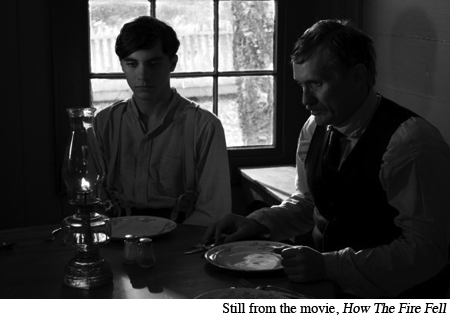
Jacob Reehl & David Poland as Roy Robinett & O.V. Hurt
Oregon Daily Journal (Portland) 7/3/1906 p8
Creffield Ruined Entire Family
O. V. Hurt Tells Jury Of Breaking Up Of His Once
Happy Home.
Refuses To Shield Any Member Of Household
Recounts Tale Which Defense Claims Made George
Mitchell Raving Maniac Bent Only Upon Revenge For Sister’s Wrong By Holy
Roller.
Corvallis Times 7/6/1906 p1
O. V. Hurt Testifies
Tells Jury how Creffield Ruined and Broke Up His Once
Happy Family.
(Special Dispatch to The
Journal)
Seattle, July 3.--O. V. Hurt, father of Maud Creffield, wife of the dead
prophet, Joshua, is the main feature of the drama being enacted in the superior
court before 12 men sworn to decide whether George Mitchell was justified in
taking the life of the Holy Roller leader.
The courtroom was crowded
and every spectator hung on the words of the father telling the story of how
his daughter was ruined, family ruined and disrupted by the lust of the
fanatical religious leader. Hurt told everything he knew. He did not save those
he loved from public disgrace that that he knew must necessarily follow the
exposure. He was a friend of George Mitchell, and shifting his glance from one
juror to another, he told the tale of misery brought to his family by
Creffield.
O. V. Hurt testified that he
met George Mitchell in Portland a month before the shooting and then related
the story he poured into George Mitchell’s ears, which the defense claims made
a maniac of the farmer boy and sent him on his search for Creffield bent upon
murder.
He told the whole story of
the Holy Rollers as he knew it from bitter experience.
At times Hurt wept and begged Attorney Will H. Morris, one of Mitchell’s
attorneys, not to force him to go further into the vile story. But the attorney
begged him to tell all and Hurt, after a glance at Mitchell, would comply.
STORY OF O. V. HURT
With shame at the horrible
story he was forced to tell, but the firm determination to do all in his power
toward liberating George Mitchell, O. V. Hurt of Corvallis, while on the
witness stand yesterday afternoon told the whole story of the orgies held by
“Apostle” Edmund Creffield and his deluded followers. In order to get the testimony
of Mr. Hurt before the jury it was introduced as a statement made by him to the
defendant before the killing of Creffield. Mr. Hurt said: (See Morning
Oregonian (Portland) Tue 7/3/1906 p1)
Seattle Post Intelligencer 7/3/1906 p1
Insane Delusion Mitchell’s Plea
Fixed Purpose in Mind to Kill Crefeld Said to Have
Religious Basis
Tells Of Holy Rollers
Father of Mrs. Crefeld Describes Actions of Sect Which Broke Up His Home
The first day of the defense
in the trial of George Mitchell, accused of murder in the first degree in the
killing of Franz Edmund Crefeld included:
An opening statement by
Attorney Silas M. Shipley, occupying about three hours in which the lawyer
stated that the evidence points to the conclusion that Mitchell was suffering
from an “insane delusion,” which, he claimed, is a different kind of insanity
altogether from that force which occasionally comes over a man in the form of
an irresistible impulse.
The hearing of the testimony
of Esther Ann Mitchell, the 18-year-old sister of the accused, and one of the
followers of Crefeld; of A. R. Mills, a Newberg, Or., fruit grower who knew Mitchell’s father since the latter was 16 years old, and
who was called to testify as to the mental peculiarities of the family; of Mrs.
Burgess E. Starr, another sister of the accused man, who identified some of the
exhibits of the defense which are later to be introduced as evidence and who,
along with her sister, stated that another brother, Fred, had attempted suicide
at Portland three and one-half years ago; and of O. V. Hurt, father-in-law of
Crefeld and a man who is declared to have been for a time partially under the
influence of Holy Rollerism, at whose Corvallis home some of the meetings of
the sect were held.
ACTS OF HOLY ROLLERS
Finally, the day afforded an
opportunity for many little incidents of psychological interest in determining
the state of mind of the Mitchell family, of the accused man and of the public
towards him.
It was not until the closing
half-hour of court that the long-looked for evidence concerning the doings of
the Holy Rollers, as told by those whom the belief injured most, began to
appear. O. V. Hurt was allowed to tell the substance of a conversation he had
had with Mitchell regarding the doings of this sect, and the crowded court room became suddenly still.
At first the witness
hesitated to produce before a court room where the
audience contained a fair percentage of women the details of the wrecking of
his domestic life. Once fairly launched on the subject, however, his animus
against the doctrines of the sect overcame other considerations, and aroused in
him an unexpected expression of feeling which amounted
almost to eloquence. Occasionally he was interrupted by counsel for one side or
the other, but put in connected form his story was, in substance:
“I told Mitchell of Crefeld
and of his practices and prayers and their effect. I told him of the wonderful
power Crefeld had over his followers, such that whatever he said they should
do, they did.
“I told George that the Crefeld
followers, including Esther, Donna (Mrs. B. E. Starr, another sister of the
accused man) and my wife would lie on the floor for hours. A few of them had
the further power of going into trances at these times, and one of these latter
was Esther Mitchell. During the trances they received messages from God. At
times, while lying on the floor, they would pray continually. At other times
they would shout so that they could be heard a half-mile away. I told him that
Crefeld would stand over them while they were lying there in a circle, and tell
them to do this, or God would smite them.
“I said to him they were all
in a religious frenzy, and were all crazy. I said my wife, son and daughter had
all been sent to the insane asylum, and that George’s sister had been taken
from my home and sent to the Boys’ and Girls’ Aid Society in Portland.
SACRIFICES OFFERED UP
“I told him that at one time
the Holy Rollers had had a burnt sacrifice, slaying two dogs and a cat. I told
him there was talk of their offering up a little child.”
Here Deputy Prosecuting
Attorney John F. Miller interposed and objection, and the part of the evidence
referring to sacrifices was stricken.
“I told him,” continued the
witness, “how my family and his sisters had removed their clothing except light
wrappers, and would not sit in a chair. I told him how my family would not eat
in my presence, and how my wife would not have anything to do with her own
child. She said it was not regenerated. I told him that man had ruined my
family, my wife and his sisters. My own daughter would have nothing to do with
me, and I sent her to the Boys’ and Girls Aid Society. In a few days she wrote
that she was ready to come back, and she told me of Crefeld’s teachings.
Then followed a recital of
some practices said to have been carried out at the
instigation of Crefeld. Hurt’s testimony will be continued this morning.
The first act of the defense
after Mr. Shipley had made the opening statement, was
to call for Mrs. Burgess E. Starr as a witness. Mrs. Starr was not present at
the time, and it developed that she refused to come. Will H. Morris, for the
defense also made the statement that she had refused to come in the morning as
well, until compelled to do so by a deputy sheriff. A deputy was sent for her
in the afternoon.
Esther Mitchell was called. She
answered the questions put her without great hesitation.
She gave her residence as
Seattle. She said she was livings with Mrs. Kelly, the
police matron. She had met Crefeld in Portland first six years ago. she was then asked to testify regarding her second oldest
brother, Fred Mitchell, and to tell whether anything had happened to him at
Portland three and one half years ago.
After a time the girl
answered: “Nothing accidental.”
Further questioning elicited
the statement that Fred Mitchell had shot himself at the Merchants hotel,
Portland, in January three years ago.
ODDITIES OF FAMILY
A. R. Mills, a fruit grower
of Newberg, was questioned concerning any oddities or eccentricities he might
have noticed during George Mitchell’s father during the long time he had known
him.
This precipitated a long
argument. The jury was dismissed and counsel for the defense fortified itself
with a long list of authorities from the law books they had brought. Mr. Miller
combated the preposition on the ground that while it might be competent to show
insanity in the accused man’s ancestry or family, it was not so to show merely
eccentricities.
In this discussion George
Mitchell took little interest. Seated at the table of counsel, he was
approached by his pretty little flaxen-haired niece, who greeted her uncle with
all a child’s simplicity and unconscious disregard of the crowd
which was watching her. The young man took her up on his knee, and there
the little girl was quite contented until summoned away by friends outside then
she trotted happily down the aisle, followed by an affectionate gaze from her
uncle.
Other evidence there were
during the day that told of friendship for George Mitchell, even though he is
accused of taking the life of his fellow man. Throughout the day the man
carried a bouquet of sweet pees, sweet Williams and other old fashioned
flowers. They had been presented to him by some women in the
crowd. The prisoner was greeted effusively by some of his Oregon acquaintances
as he left the court room at the noon session. One motherly-looking old lady was almost overcome by excitement
as she wrung his hand in vigorous fashion.
“God bless you, George,” she
said, “you’re not gone yet.”
Even Esther Mitchell,
pictured though she has been as stolid, cold and undemonstrative, showed that
natural revulsion of feeling which might be expected from a young girl,
particularly one who has been given over to the expression of religious fervor
as she has. In the court room she was under a strain
and was keyed up to bear it. When she reached the judges chambers, where she
has been kept, there was no need to do this, and the girl gave away to a good
cry, which brought back a natural appearance to her eyes and a bright, healthy
color to her cheeks.
MRS. STARR ON STAND
When the long argument of
counsel was over, Mr. Mills was excused, and Mrs. Donna Starr placed on the
stand. She was first asked to identify two letters and an envelope. One letter
had been written by her the night she left home to rejoin Crefeld at Waldport. Mr.
Shipley had told of it in his opening statement, and quoted it as follows:
I cannot wait until daylight
because the babied would cry to go with me. I have taken about $3.50 of your
money, but I guess I have been worth that much to you. It is not enough to pay
my fare, and I will have to walk to the place I am going.”
The second letter was
somewhat of a surprise to the witness, and she held it fully five minutes
before she answered the question as to whether it was in her handwriting. It
was a letter which had been received by the attorneys
for the defense only yesterday morning and was written by her from Portland to
her brother-in-law, Clarence Starr, and wife, of Corvallis, in January 1905. Crefeld
was at the time in the Oregon penitentiary, and the writer said she had come to
a realization of the wrongs she had those to whom she was writing, and asked
them to forgive her, as she had been under the power of another.
“Don’t tear that, Mrs.
Starr. I want it,’ was the exclamation of Mr. Morris, as he saw the witness
take the letter in both hands, and start to fold it. The envelope admitted for
identification was the one in which the letter had been sent to Corvallis. Mr.
Morris read the address: “Mrs. Hattie Starr, Corvallis, Or.”
“What, if any relationship
exists between yourself and this defendant?” Mrs. Starr was asked. The question
had to be repeated, and then, after a long pause, came the answer:
I don’t understand. He’s my
brother.”
She also was asked to tell
what she knew of her brother Fred’s alleged attempt at suicide, and said she
had seen the wound in his forehead as he lay at the hospital.
DEFENSE IS INSANITY
The feature of Mr. Shipley’s
statement to the jury yesterday morning, in addition to the doings of Crefeld
and his followers, which he said he would prove by the evidence, was possibly
the distinction which he drew as to the forms of
insanity. The accused man, he claimed was the victim of an insane delusion. He
had had hallucinations in the belief that he had heard his mother’s spirit and
other beings of the unseen world talking to him. He had believed these were the
“word of God,’ and he had the delusion that God commanded him to kill Crefeld.
It will be the attempts of
the defense to show that this action of Mitchell was by no means simply one of
revenge for wrongs he believed done him and the women of his
family, but that it was a result of the same religious frenzy which, the
defense says, has characterized his sisters and his father to a degree. Mr.
Shipley made the statement that Mitchell had told Louis Hartley, after the
latter had attempted in vain to kill Crefeld, his gun refusing to work, that
God had prevented Hartley from doing the act, and that it was Mitchell’s task
to put Crefeld out of the way by a painless death. Only such a delusion, Mr.
Shipley contended, could account for Mitchell’s strange composure and
fearlessness after he had killed Crefeld and been taken into custody.
(Next to this is an article
“Woman, Disguised as Man, Cooks on a Tug.”)
Evening Telegram (Portland) 7/3/1906 p16
Converted at Revival, Woman. Pays Visit to Heaven in
Trance.
A “holiness meeting” at 235
Second Street was broken up by the overzealousness of Mrs. Julia Smith, who had
suddenly become “saved.” The place is conducted by John F.
Glasco and wife, colored, but is frequented mostly by whites. At the
close of a period of shouting on the part of the congregation Mrs. Smith threw
up her hands.
“Glory, glory, I am saved,’
she shouted, and fell in a swoon.
She was taken upstairs over the storeroom in which the meeting was held. Her limbs became rigid as though death had ensued. After working with her for half an hour, the evangelists were gratified at her coming back to life, when she said she had been dead and had visited heaven and had seen the angels. She was finally rational enough to walk to her home a few blocks away, but the crowd thus assembled in the meantime nearly filled the street Salmon and Main.
Chapters of Holy Rollers where these articles are some of the sources:
Chapter 5: A Sacrificial Bonfire
Chapter 14: Men are Gunning for Creffield
Chapter 20: Testimony
***![]() July 2, 1906: Esther Mitchell on Stand
July 2, 1906: Esther Mitchell on Stand
![]() July 4, 1906: Mitchell Weeps While Starr Testifies
July 4, 1906: Mitchell Weeps While Starr Testifies
***
Newspaper Articles about Creffield & the Holy Rollers
1897-1903: B.C. (Before Creffield)
October to December 1903:Holy Rollers Burn Furniture & Pets
January to March, 1904: Holy Rollers Tarred and Feathered
April to June 1904: Holy Rollers are Committed to the Asylum
July 1904: Creffield is Found & Arrested
September 1904: Creffield's Trial
April 1906: Men are Gunning For Creffield
May 1906: Creffield is Murdered, Murderer is Considered a Hero
May 1906: Holy Rollers Found Starving Near Heceta Head
June 1906: George Mitchell's Trial Begins
July 1906: Hurt Testifies of Debauched Wife and Debased Sisters
July 1906: Esther Mitchell Kills Her Brother
August to October 1906: Seattle Prepares for another Big Trial
November 1906: Maud Hurt Creffield Commits Suicide
April 1909-August 1914: Esther Leaves the Asylum
1953 Stewart Holbrook's Murder Without Tears
1951Startling Detective Magazine, Nemesis of the Nudist High Priest
***
Chapters from
Holy Rollers: Murder & Madness in Oregon's Love Cult
Part 1: The Seduction
Chapter 1: Trust Me, Brothers And Sisters
(Life Before Creffield [B.C.])
Chapter 2: God, Save Us From Compromising Preachers
(Creffield's Preachings)
Chapter 3: The Flock
(Profiles of the Holy Rollers Were)
Chapter 4: The Holy Rollers
(Things Start to Get Wild on on Kiger Island)
Chapter 5: Housecleaning
(There's a Sacrificial Bonfire)
Chapter 6: Community Concerns
(Officers Visit)
Chapter 7: Esther, The Chosen One
(Creffield Plans to Marry 16-Year- Old)
Chapter 8: Tar and Feathers
(The Men of Corvallis Act)
Chapter 9: Sane People Don’t Go Bareheaded
(Holy Rollers are Committed to the Asylum)
Chapter 10: More Beast Than Man
( Creffield is Arrested)
Chapter 11: God Will Plead Creffield's Case
(Creffield in Court)
Chapter 12: Scandal
(Shocking Testimony at the Trial)
Chapter 13: Calm Before the Storm
(The Holy Rollers Resume their Lives)
Chapter 14: Giving Up The Ghost
(Men are Gunning for Creffield)
Part Two: The People V. Creffield
Chapter 16: The Widow Creffield
Chapter 19: An Inherited Streak of Insanity
Part Three: The Madness
Chapter 23: Seeking Reconciliation
Chapter 24: Another Holy Roller Page One Murder
Chapter 25: What Can Papa Do For You?
Chapter 26: Human Life is Too Cheap In This Community
Chapter 30: The Final Chapter
(What Happened to Everyone Afterwards)
The Epilogue
(Heaven's Gate)
